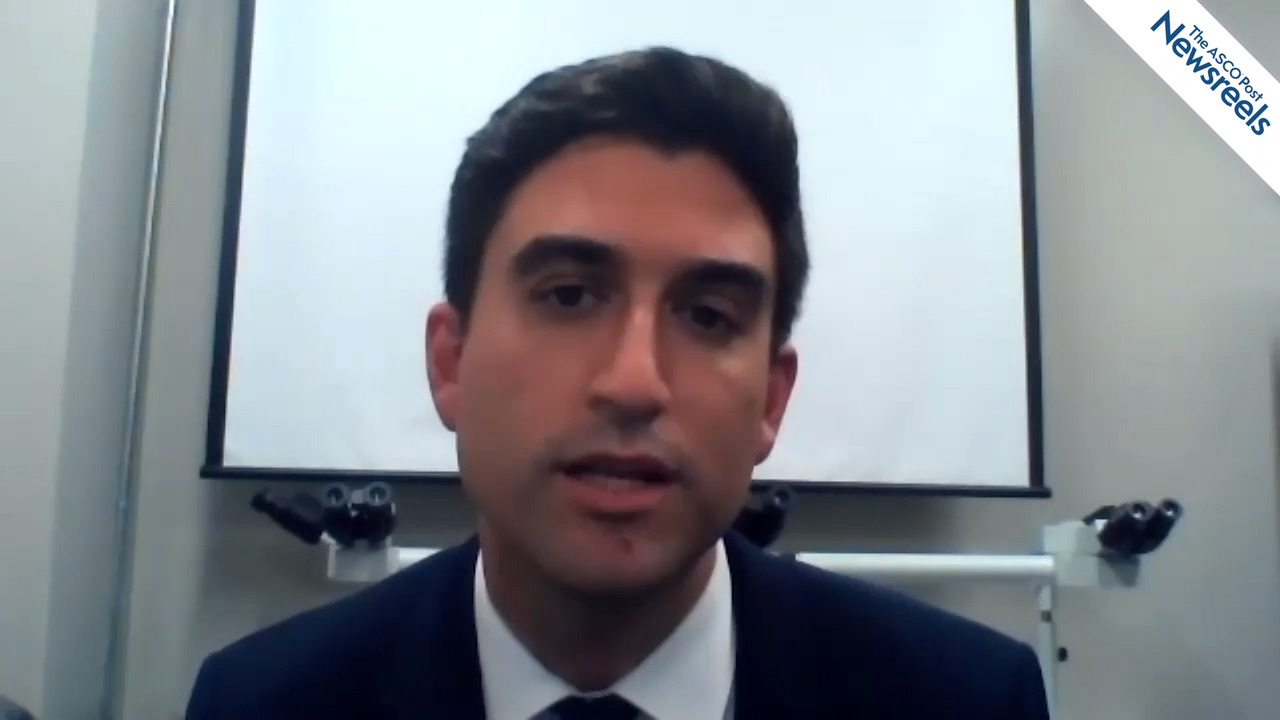David T. Teachey, MD, on Pediatric Leukemia and Lymphoma: New Findings on Cranial Radiation and Bortezomib
David T. Teachey, MD, of the University of Pennsylvania and Children’s Hospital of Philadelphia, discusses data showing that cranial radiation might be eliminated in most children with T-cell acute lymphoblastic leukemia and that bortezomib may improve survival in children with T-cell lymphoblastic lymphoma (Abstract 266).
ASH 2020: Chemotherapy Plus Blinatumomab for Philadelphia Chromosome–Negative B-Cell ALL
Results from a phase II study presented by Nicholas J. Short, MD, and colleagues at the 2020 American Society of Hematology (ASH) Annual Meeting & Exposition (Abstract 464) showed that first-line treatment with a regimen of chemotherapy combined with the monoclonal antibody blinatumomab...
Expert Point of View: David Snyder, MD
David Snyder, MD, Acting Chair, City of Hope Department of Hematology & Hematopoietic Cell Transplantation, Duarte, California, who was not involved in the ASCEMBL study, commented on the promise of asciminib: “The hope is this drug would be able to overcome resistance to other tyrosine kinase...
ASH 2020: Study Finds Asciminib Safer, More Effective Than Bosutinib in Chronic Phase CML
Since the introduction of imatinib almost 18 years ago, similar next-generation tyrosine kinase inhibitors have been approved for chronic myeloid leukemia (CML), including dasatinib, nilotinib, bosutinib, and ponatinib. These drugs attack a similar target, making it more likely that resistance to...
ASH 2020: Role of Venetoclax in High-Risk Myeloid Malignancies
The BCL2 inhibitor venetoclax can be safely added to standard therapies for some high-risk myeloid blood cancers, and in early studies, the combination showed improved outcomes, according to two reports presented by Jacqueline S. Garcia, MD, and colleagues at the 2020 American Society of Hematology ...
Curtis Lachowiez, MD, on AML: Venetoclax in Combination With Standard Intensive Induction/Consolidation Therapy
Curtis Lachowiez, MD, of The University of Texas MD Anderson Cancer Center, discusses an interim analysis of a phase Ib/II study showing that venetoclax plus chemotherapy represents an effective regimen, particularly in patients with newly diagnosed and relapsed or refractory acute myeloid leukemia. The regimen appears to be an effective bridge to hematopoietic stem cell transplantation (Abstract 332).
ASH 2020: Novel Antibody-Drug Conjugate Shows Activity in Rare, Aggressive Form of Leukemia
A phase I/II study found that IMGN632, a novel CD123-targeting antibody-drug conjugate, was tolerable and resulted in a 29% overall response rate in patients with relapsed or refractory blastic plasmacytoid dendritic cell neoplasm (BPDCN), a rare but aggressive form of leukemia. Treatment with the...
Ann-Kathrin Eisfeld, MD, on AML in Black Patients: Racial Disparities in Survival Outcomes
Ann-Kathrin Eisfeld, MD, of The Ohio State University Comprehensive Cancer Center, discusses SEER data showing that patients with acute myeloid leukemia who are Black and younger than age 60 may have poor survival outcomes, a disparity that should be addressed and further studied to establish molecular risk profiles (Abstract 6).
ASH 2020: Does Race Contribute to Poor Outcomes in Younger Black Patients Diagnosed With AML?
It has been well documented that, collectively, Black individuals have the highest death rate and shortest survival of any racial/ethnic group in the United States for most cancers. Black men also have the highest cancer incidence. Although the causes of these inequities are complex, a study by...
ASH 2020: Study Examines Impact of Neighborhood Socioeconomic Status on Outcomes in Minority Patients With AML
Studies show that non-Hispanic Black and Hispanic patients with acute myeloid leukemia (AML) have higher mortality rates than non-Hispanic White patients diagnosed with the disease, despite lower rates of incidence, more favorable genetics, and a younger age at disease onset. A study by Abraham et...
FDA Pipeline: Agents in DLBCL, SCLC, AML, and More
Recently, the U.S. Food and Drug Administration (FDA) has issued regulatory decisions for agents to treat diffuse large B-cell lymphoma (DLBCL), small cell lung cancer (SCLC), acute myeloid leukemia (AML), biliary tract cancer, and graft-vs-host disease. Priority Review for Loncastuximab Tesirine...
Dasatinib/Blinatumomab Produces High Rates of Molecular Response and Survival in Philadelphia Chromosome–Positive ALL
In an Italian phase II trial (GIMEMA LAL2116) reported in The New England Journal of Medicine, Robin Foà, MD, of Sapienza University of Rome, and colleagues, found that first-line induction and consolidation treatment with dasatinib and blinatumomab produced a high rates of molecular response as...
Venetoclax in Combination Therapy for Untreated Acute Myeloid Leukemia
On October 16, 2020, venetoclax was granted regular approval for use in combination with azacitidine, decitabine, or low-dose cytarabine for the treatment of newly diagnosed acute myeloid leukemia (AML) in adults aged 75 years or older or those with comorbidities precluding intensive induction...
4-Year Findings From MURANO Trial: Venetoclax Plus Rituximab for Relapsed Chronic Lymphocytic Leukemia
As reported in the Journal of Clinical Oncology by Arnon P. Kater, MD, PhD, of Amsterdam University Medical Centers, and colleagues,1 the 4-year progression-free and overall survival rates were significantly higher with venetoclax plus rituximab vs bendamustine plus rituximab in the phase III...
Final ASCEND Results Confirm Acalabrutinib as a Standard for Relapsed CLL
The Bruton’s tyrosine kinase (BTK) inhibitors have been one of the most exciting advances in the treatment of patients with chronic lymphocytic leukemia (CLL) and have led to the development of chemotherapy-free treatments for both treatment-naive as well as relapsed or refractory CLL based on...
Acalabrutinib Improves Progression-Free Survival vs Idelalisib Plus Rituximab or Bendamustine Plus Rituximab in Relapsed or Refractory CLL
As reported in the Journal of Clinical Oncology by Paolo Ghia, MD, PhD, of the Università Vita-Salute San Raffaele, Milan, Italy, and colleagues, the phase III ASCEND trial showed significantly prolonged progression-free survival with acalabrutinib monotherapy vs investigator’s choice of either...
Novel Therapies and New Indications for Use in Treatment of Hematologic Malignancies
Daratumumab and hyaluronidase-fihj: On May 1, 2020, the FDA approved daratumumab and hyaluronidase-fihj (Darzalex) for adult patients with newly diagnosed or relapsed or refractory multiple myeloma. Ibrutinib: On April 21, 2020, the FDA expanded the indication of ibrutinib (Imbruvica) to include...
Novel Therapies and New Indications for Use in Treatment of Hematologic Malignancies
Venetoclax: On October 16, 2020, the U.S. Food and Drug Administration (FDA) approved venetoclax (Venclexta) in combination with azacitidine, decitabine, or low-dose cytarabine for newly diagnosed acute myeloid leukemia (AML) in adults aged 75 or older. See page 32 for more on this approval....
Hematologic Oncology Highlights 2019–2020 Almanac
The past year has seen remarkable advances in the treatment of leukemia, lymphoma, and multiple myeloma, which combined account for 9.9% of the estimated 1,806,590 new cases of cancer diagnosed in the United States and an estimated 56,840 cancer-related deaths.1 Novel therapies are providing...
Venetoclax Combination in Newly Diagnosed AML
On October 16, 2020, the U.S. Food and Drug Administration (FDA) granted regular approval to venetoclax (Venclexta) in combination with azacitidine, decitabine, or low-dose cytarabine for newly diagnosed acute myeloid leukemia (AML) in adults aged 75 or older or who have comorbidities precluding...
ASH Releases New Clinical Practice Guidelines on Treatment of Older Adults With Newly Diagnosed Acute Myeloid Leukemia
The American Society of Hematology (ASH) has published new guidelines to help older adults with acute myeloid leukemia (AML) and their health-care providers make critical care decisions, including if and how to proceed with cancer treatment and the need for blood transfusions for those in hospice...
Optimizing the Treatment of Adults With Acute Lymphoblastic Leukemia
In the treatment of adults with acute lymphoblastic leukemia (ALL), use of newer antibodies and de-intensification of chemotherapy have greatly improved outcomes, according to Hagop Kantarjian, MD, FASCO, who has been very involved in much of the research in ALL treatment. Dr. Kantarjian, Professor ...
Effects of Stopping Tyrosine Kinase Inhibitor Treatment for Chronic Myeloid Leukemia
In a study (Life After Stopping TKIs; LAST) reported in JAMA Oncology, Atallah et al found that stopping tyrosine kinase inhibitor (TKI) therapy in patients with controlled chronic myeloid leukemia (CML) was associated with maintenance of major molecular response and achievement of treatment-free...
Addition of Venetoclax to Bortezomib/Dexamethasone in Relapsed or Refractory Multiple Myeloma: BELLINI Trial
As reported in The Lancet Oncology by Shaji K. Kumar, MD, and colleagues, the phase III BELLINI trial has shown that the addition of venetoclax to bortezomib/dexamethasone significantly prolonged progression-free survival in patients with relapsed or refractory multiple myeloma but was associated...
Ivosidenib Plus Azacitidine in Newly Diagnosed IDH1-Mutant Acute Myeloid Leukemia
In a phase Ib study reported in the Journal of Clinical Oncology, Courtney D. DiNardo, MD, and colleagues found that the combination of ivosidenib and azacitidine produced a high response rate in patients with newly diagnosed isocitrate dehydrogenase 1 (IDH1)-mutant acute myeloid leukemia...
Comanagement of Induction Therapy for Acute Promyelocytic Leukemia by Experts and Community Practices
In a study reported in JCO Oncology Practice, Anand P. Jillella, MD, and colleagues found that physician education on the main causes of death during induction treatment for acute promyelocytic leukemia (APL)—and comanagement of cases with expert physicians—resulted in a low early mortality rate...
rhG-CSF and Decitabine to Reduce Risk of Relapse in Patients With AML After Stem Cell Transplant
In a Chinese phase II trial reported in the Journal of Clinical Oncology, Gao et al found that prophylactic recombinant human granulocyte colony-stimulating factor (rhG-CSF) and minimal-dose decitabine reduced the risk of relapse vs no intervention among patients with high-risk, minimal residual...
Chronic Lymphocytic Leukemia: New Treatments Achieve Deeper Remissions
At the National Comprehensive Cancer Network® (NCCN®) 2020 Virtual Congress: Hematologic Malignancies, William Wierda, MD, PhD, of The University of Texas MD Anderson Cancer Center, Houston, reviewed current data on chronic lymphocytic leukemia (CLL), including promising new combinations of modern...
Bispecific Anti-CD20/Anti-CD19 CAR T Cells for Patients With Relapsed B-Cell Malignancies
In a single-institution phase I dose-escalation and -expansion trial reported as a letter in Nature Medicine, Shah et al found that treatment with tandem bispecific anti-CD20/anti-CD19 4-1BB–CD3ζ lentiviral (LV20.19) chimeric antigen receptor (CAR) T cells produced high response rates in adult...
Predicting Mortality Outcomes After Intensive Chemotherapy for AML
In a single-institution study reported in the Journal of Clinical Oncology, Palmieri et al found that the Ferrara criteria for determining fitness for intensive chemotherapy—a set of consensus criteria proposed by a panel of experts from the Italian Society of Hematology, Italian Society of...
First-in-Human Study of LSD1 Inhibitor Iadademstat for Patients With Relapsed or Refractory AML
In a first-in-human phase I trial reported in the Journal of Clinical Oncology, Salamero et al identified toxicities and activity associated with iadademstat, an oral first-in-class lysine-specific histone demethylase 1A (LSD1) inhibitor, in patients with relapsed or refractory acute myeloid...
First-Line Dasatinib Plus Blinatumomab for Adult Patients With Philadelphia Chromosome–Positive Acute Lymphoblastic Leukemia
In an Italian phase II trial (GIMEMA LAL2116) reported in The New England Journal of Medicine, Foà et al found that first-line induction and consolidation treatment with dasatinib plus blinatumomab produced a high rate of molecular response in adults with Philadelphia chromosome–positive acute...
Preliminary Progress with Genetically Engineered T Cells in Treating Childhood ALL
Two small phase I studies at separate centers demonstrated encouraging results in the treatment of children with acute lymphoblastic leukemia (ALL) using reinfused autologous genetically engineered T cells. Results of both studies were presented at the Annual Meeting of the American Association for ...
FDA Pipeline: Priority Reviews in EGFR-Mutant Lung Cancer, Advanced Renal Cell Carcinoma; Fast Track Designations in CLL and Solid Tumors
Recently, the U.S. Food and Drug Administration (FDA) granted Priority Review to treatments for EGFR-mutant lung cancer and advanced renal cell carcinoma; granted Fast Track designation to agents in chronic lymphocytic leukemia (CLL) and locally advanced or metastatic solid tumors; and more....
Association of Minimal Residual Disease With Disease-Free and Overall Survival in Patients With AML
In a systematic review and meta-analysis reported in JAMA Oncology, Nicholas J. Short, MD, and colleagues found that minimal (or measurable) residual disease (MRD) negativity is associated with superior disease-free and overall survival in patients with acute myeloid leukemia (AML). As stated by...
FDA Approves Venetoclax Combination Regimen for Certain Adult Patients With AML
On October 16, the U.S. Food and Drug Administration (FDA) granted regular approval to venetoclax (Venclexta) in combination with azacitidine, decitabine, or low-dose cytarabine for newly diagnosed acute myeloid leukemia (AML) in adults age 75 or older or who have comorbidities precluding intensive ...
Prognostic Model for Outcomes With Ibrutinib Treatment for Chronic Lymphocytic Leukemia
As reported in the Journal of Clinical Oncology, Ahn et al developed a four-factor model that identified risk groups for poorer outcomes among patients treated with ibrutinib for chronic lymphocytic leukemia. Study Details Patients treated with ibrutinib in phase II and III trials constituted the...
Addition of Nelarabine to Standard Therapy Improves Disease-Free Survival in Newly Diagnosed T-Cell ALL
As reported in the Journal of Clinical Oncology by Kimberly P. Dunsmore, MD, of the Virginia Tech Carilion School of Medicine and Carilion Clinic, Roanoke, and colleagues, the phase III Children’s Oncology Group AALL0434 trial has shown that the addition of nelarabine to standard therapy improved...
Four-Year Findings From the MURANO Trial: Venetoclax Plus Rituximab for Relapsed Chronic Lymphocytic Leukemia
As reported in the Journal of Clinical Oncology by Kater et al, 4-year progression-free and overall survival were significantly greater with venetoclax plus rituximab vs bendamustine plus rituximab in the phase III MURANO trial in patients with relapsed or refractory chronic lymphocytic leukemia....
Addition of Venetoclax to Azacitidine in Acute Myeloid Leukemia
In the phase III VIALE-A trial reported in The New England Journal of Medicine, Courtney D. DiNardo, MD, MSCE, of The University of Texas MD Anderson Cancer Center, and colleagues found that venetoclax plus azacitidine significantly improved overall survival vs azacitidine alone in previously...
Azacitidine Tablets for Continued Treatment in Acute Myeloid Leukemia
In the Clinic provides overviews of novel oncology agents, addressing indications, mechanisms of action, administration recommendations, safety profiles, and other essential information needed for the appropriate clinical use of these drugs. On September 1, 2020, azacitidine tabletswere approved...
FDA Pipeline: Designations in Prostate Cancer, Glioblastoma, and Pediatric Leukemia
Recently, the U.S. Food and Drug Administration (FDA) granted designations to agents for metastatic castration-resistant prostate cancer, recurrent glioblastoma, and pediatric acute myeloid leukemia. Fast Track Designation for EPI-7386 in Metastatic Castration-Resistant Prostate Cancer The FDA...
Dr. Kantarjian Shares His Thoughts on Optimizing the Treatment of Adults With ALL
In the treatment of adults with acute lymphoblastic leukemia (ALL), use of newer antibodies and de-intensification of chemotherapy have greatly improved outcomes, according to Hagop Kantarjian, MD, who has been very involved in much of the research in ALL treatment. Dr. Kantarjian, Professor and...
Role of Inherited GATA3 Variant in Response to Treatment, Disease Relapse in Pediatric ALL
Research published by Zhang et al in the Journal of the National Cancer Institute showed that an inherited variation in the GATA3 gene strongly influences early response to chemotherapy and is linked to relapse in children with acute lymphoblastic leukemia (ALL). Minimal residual disease (MRD)...
FDA Pipeline: Priority Reviews in Multiple Myeloma, Metastatic Breast Cancer, and NSCLC
Recently, the U.S. Food and Drug Administration (FDA) granted Priority Review to agents for the treatment of refractory multiple myeloma, metastatic breast cancer, and metastatic non–small cell lung cancer (NSCLC); gave Fast Track designation to treatments for NTRK mutation–positive solid tumors...
CLL14 Trial Follow-up: Venetoclax Plus Obinutuzumab in Previously Untreated Patients With Chronic Lymphocytic Leukemia
As reported in The Lancet Oncology by Al-Sawaf et al, 3-year follow-up of the phase III CLL14 trial showed maintained significant improvement in progression-free survival with the fixed-duration regimen of venetoclax/obinutuzumab vs chlorambucil/obinutuzumab in previously untreated patients with...
FDA Approves Oral Azacitidine as Maintenance Therapy for Adults With AML in First Remission
On September 1, the U.S. Food and Drug Administration (FDA) approved oral azacitidine (Onureg; also known as CC-486) for the continued treatment of adult patients with acute myeloid leukemia (AML) who achieved first complete remission or complete remission with incomplete blood count recovery...
Addition of Nelarabine to Standard Therapy in Newly Diagnosed T-Cell Acute Lymphoblastic Leukemia
As reported in the Journal of Clinical Oncology by Dunsmore et al, the phase III Children’s Oncology Group AALL0434 trial has shown that the addition of nelarabine to standard therapy improved disease-free survival in children and young adults with newly diagnosed T-cell acute lymphoblastic...
Obinutuzumab, Ibrutinib, and Venetoclax in Treatment-Naive and Relapsed or Refractory Chronic Lymphocytic Leukemia
In a single-institution phase II trial reported in the Journal of Clinical Oncology, Rogers et al found that the combination of obinutuzumab, ibrutinib, and venetoclax produced high response rates in both treatment-naive and relapsed or refractory chronic lymphocytic leukemia. Study Details A total ...
Final ASCEND Results Confirm Acalabrutinib as a Standard for Relapsed CLL
The Bruton’s tyrosine kinase (BTK) inhibitors have been one of the most exciting advances in the tre atment of chronic lymphocytic leukemia (CLL) and have led to the development of chemotherapy-free treatments for both treatment-naive as well as relapsed or refractory CLL based on studies where...



